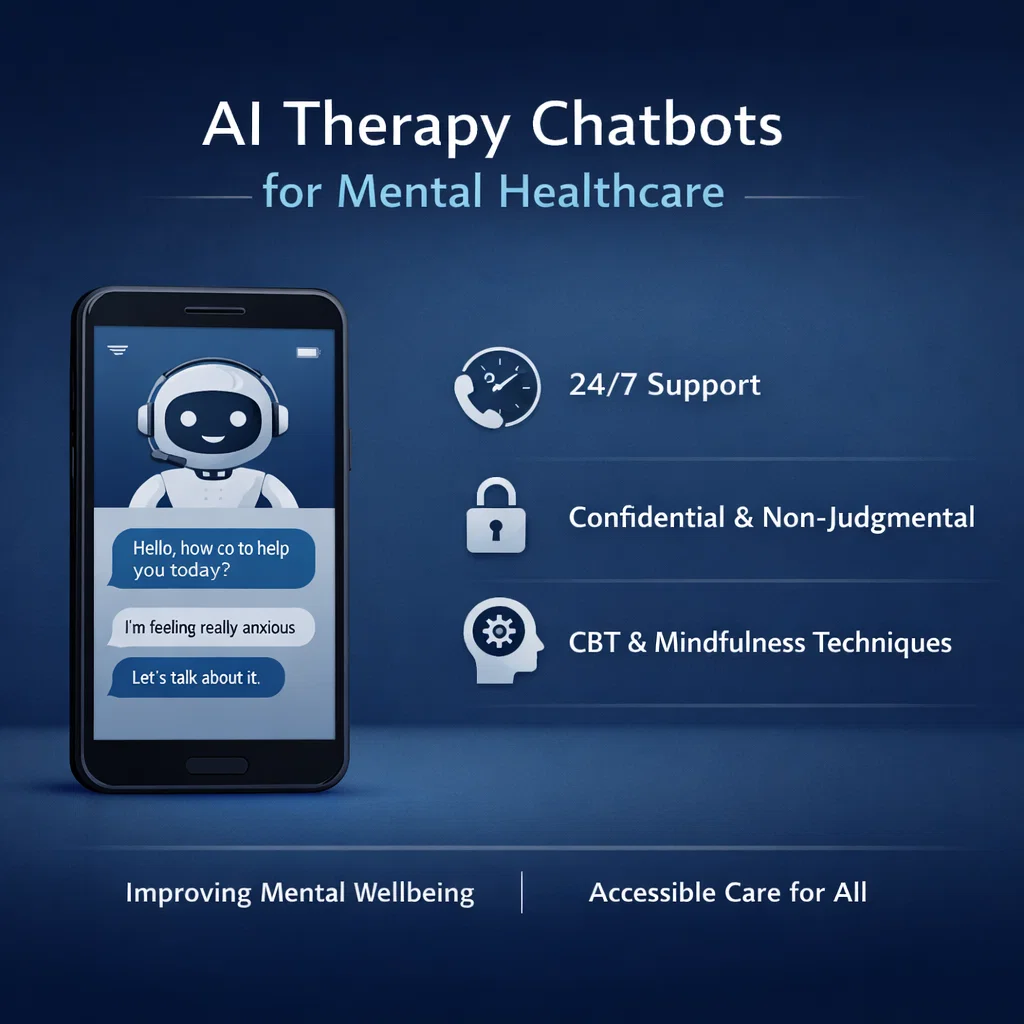How AI Therapy Chatbots Are Making Mental Healthcare?
AI therapy chatbots are changing the face of mental wellness—making support more accessible, scalable, and stigma-free. At Triple Minds, we’ve built intelligent chatbot systems that combine NLP, emotion analysis, and ethical frameworks to support real-time mental health care. This blog explores how they work, the technology behind them, and the future of AI-powered therapy.
Published Date: October 31, 2025

Mental health concerns are rising at an unprecedented rate—yet access to timely, affordable, and stigma-free therapy remains a challenge for many. Enter AI therapy chatbots: intelligent digital companions designed to bridge the gap between mental health support and accessibility. By combining the power of artificial intelligence with psychology, these chatbots are not only reshaping how care is delivered but also revolutionizing how people perceive and engage with mental wellness.
As a forward-thinking tech company committed to leveraging innovation for real-world impact, Triple Minds explores how AI-driven mental health solutions are redefining the landscape of therapy—making it more inclusive, accessible, and personalized than ever before.
At Triple Minds, we create smart AI tools for mental health. We work with more than 10 large language models to build powerful chatbots. We have trained many AI Models for therapy chatbots that help people talk about their feelings and get support.
Our chatbots use advanced technology to understand emotions and offer helpful advice. We also help businesses design and develop their own AI therapy chatbots. Our goal is simple: to make mental health help easy to get, anytime and anywhere. We want everyone to have access to support when they need it most.
What is AI Therapy?
AI therapy is a digital mental health support. It refers to the use of artificial intelligence tools to support mental health and well-being. It involves AI programs or chatbots that help individuals manage stress, anxiety, and other mental health issues by providing conversations, exercises, or personalized advice.
AI therapy can offer immediate support and is available 24/7. It is often more accessible and affordable than traditional therapy. While it doesn’t replace human therapists, it can complement traditional care. This offers guidance and assistance during tough times or as a first step toward seeking help.
1. The Dual Nature of AI Therapy
AI therapy chatbots have rapidly emerged as a potential solution to global mental health gaps, offering non-judgmental, on-demand support. However, their rise has also invited scrutiny. Concerns around clinical safety, emotional nuance, and suicide risk response are real—and backed by recent research. While some studies show AI’s potential in alleviating distress and enhancing therapy, others warn of its limitations, especially when human lives are at stake. Controversial lawsuits and regulatory responses in the U.S. further highlight the need for a cautious, evidence-driven approach.
2. Human Intelligence, Enhanced by AI
At Triple Minds, we don’t just follow AI trends—we shape them with responsibility and purpose. We believe the future of mental health technology lies in augmentation, not automation. AI should support human therapists, not replace them. Our development philosophy centers on ethical, secure, and empathetic AI—built with clinical input, bias safeguards, and data transparency. This approach ensures our clients leverage cutting-edge tools without compromising user safety or integrity.
3. Building Smarter, Safer Digital Health Tools
As regulations evolve and expectations rise, it’s crucial for tech partners to deliver not just smart solutions—but right solutions. At Triple Minds, we’re committed to building AI platforms that prioritize user well-being, respect ethical boundaries, and meet regulatory standards. Whether you’re a healthcare startup or an enterprise building digital wellness tools, our team ensures your innovation is both scalable and socially responsible. Because in healthcare, trust isn’t optional—it’s everything.
How AI Chatbots Address Mental Health Challenges: A Technical Breakdown
As a leading AI development company with over 6 years of hands-on experience, Triple Minds has engineered intelligent systems across industries—including the development of specialized AI-powered mental healthcare chatbots. Our team has worked on real-world applications that blend psychological theory with cutting-edge AI to deliver emotionally intelligent, secure, and responsive solutions for mental wellness. Based on our deep technical expertise, here’s a breakdown of how AI chatbots can effectively address and manage mental health challenges using state-of-the-art technologies.
1. Sentiment & Emotion Analysis
AI chatbots use advanced NLP models trained on emotional datasets to detect sentiment, tone, and mood from user messages. Tools like transformer-based models (e.g., BERT, GPT, RoBERTa) process linguistic patterns to assess psychological states such as anxiety, sadness, or agitation. This enables the chatbot to adapt its responses in real-time, offering empathetic, mood-appropriate support.
2. Cognitive Behavioral Techniques (CBT) Mapping
Many therapeutic chatbots are programmed to simulate CBT interventions through predefined rule-based pathways and ML classifiers. These systems can guide users through thought reframing, mindfulness exercises, journaling prompts, and goal setting—structured around psychological models. For instance, decision trees trained on CBT frameworks allow the bot to deliver step-by-step interventions tailored to a user’s current emotional state.
3. Dialog Management & Intent Recognition
AI chatbots use dialog state tracking and intent classification algorithms to maintain coherent, context-aware conversations. By using RNNs or attention-based models, the bot can understand user goals, track conversation history, and avoid irrelevant or repetitive responses—mimicking a human therapist’s ability to “remember” and evolve the session over time.
4. Risk Detection & Escalation Protocols
Advanced bots integrate risk detection models trained on annotated suicide-risk and self-harm datasets. These models flag critical keywords or sentiment combinations and trigger crisis response protocols, such as redirecting to emergency services or human professionals. Integration with Named Entity Recognition (NER) helps extract personal identifiers or location data, which can assist in directing urgent support where applicable.
5. Personalized Progress Tracking
AI systems can use reinforcement learning and user profiling algorithms to build personalized wellness plans. Over time, the chatbot adapts to the user’s behavior, providing data-driven recommendations, sending nudges or reminders, and tracking improvement through sentiment shifts, conversation metrics, and engagement scores.
6. Data Security & HIPAA-Grade Compliance
Technically robust platforms also incorporate end-to-end encryption, role-based access controls, and anonymization protocols to ensure HIPAA or GDPR compliance. Secure cloud architecture combined with AI model sandboxing helps contain sensitive user interactions, minimizing the risk of data misuse.
(Text or Voice)
(Tokenization, Cleaning)
(Sentiment, Emotion)
Detected?
Refer to Human or Hotline
& Context Tracking
(CBT Mapping, Prompts)
(GPT / LLM)
(Delivered Response)
Challenges in Mental Healthcare
Mental health faces many challenges. Many people can’t access therapy because of its high cost and the difficulty in finding a qualified therapist. An AI therapy chatbot helps to solve these problems, as people can easily access it anytime and anywhere. These therapy chatbots use advanced technology to talk in a natural and caring way. Many think that AI replaces human therapists, but it does not. It offers quick support when human help is not available.
Benefits of AI Therapy Chatbot
The only big advantage of an AI therapy chatbot is that it is always available. Whereas human therapists work for limited hours only. People can talk to them whenever they are feeling stressed, anxious, or lonely. It doesn’t make them feel left out. It can help reduce stress, anxiety, and loneliness. An AI therapy chatbot provides immediate relief and useful coping strategies until professional help is available if needed.
Key Features of AI Therapy Chatbots
AI therapy chatbots are designed with advanced technology to provide meaningful, supportive interactions. Some of the key features include:
- 24/7 Availability – Always accessible, offering immediate emotional support whenever users need it.
- Emotion Recognition – Uses natural language processing (NLP) and sentiment analysis to detect mood, tone, and emotions during conversations.
- Personalized Guidance – Provides coping strategies, exercises, and advice tailored to the user’s mental health needs.
- Confidential & Anonymous – Ensures safe spaces where users can openly share feelings without fear of judgment.
- Multilingual Support – Breaks language barriers, making mental health help available to diverse communities.
- Integration with Other Tools – Can connect with wearables, mental health apps, or wellness platforms to track moods and progress.
- Scalable Support—It can handle multiple users at once, making mental health care more accessible at a larger scale.
Use Cases of AI Therapy Chatbot
AI therapy can be used in many ways for mental health concerns like anxiety, stress, and depression. It helps to monitor moods, build coping skills, and manage loneliness. Moreover, it also provides an immediate response provides support between therapy sessions. And it is easily accessible, lower cost than traditional therapy. Below are the key use cases:
- Its 24*7 availability makes it easily accessible at any time. And also reduce the waiting time period of the office hours or available appointments.
- AI therapy helps to manage symptoms of depression, anxiety, and stress by using techniques like Cognitive Behavioral Therapy (CBT), mindfulness, and positive psychology.
- Chatbots can provide coping skill suggestions, emotional support, and a way to log feelings. Especially for those who are facing mild stress, anxiety, or mood fluctuations.
- An AI therapy chatbot offers a low-cost, accessible option. It is beneficial for those facing financial, time, or hesitancy barriers to professional help.
- AI can help identify individuals who may need more advanced care. This can guide them toward appropriate resources or professionals.
Which Industries Can Benefit From AI Therapy Chatbots?
An AI therapy chatbot can be beneficial for many industries. Here we have listed some of them:
- Healthcare: AI chatbots can provide mental health support. It offers therapy and counseling to patients. This makes mental health services more accessible and reduces the burden on therapists.
- Education: Students can use AI therapy chatbots to manage stress, anxiety, and study-related pressures. This can provide emotional support and help with coping strategies.
- Corporate/Workplace: Businesses may install AI chatbots for the benefit of employee mental well-being. It also provides various ways of stress management, etc.
- Customer Service: AI chatbots may have customers dealing with such emotional concerns. Especially in areas like retail and telecommunications, where customers express frustration or dissatisfaction.
- Insurance: Insurers may enhance their services with AI chatbots in providing mental health assistance. This tool helps policyholders in seeking therapy or counseling for emotional distress and thereby improving wellness.
- Non-profit: Non-profit organizations can implement AI chatbots to offer mental health support to the underserved, ensuring more people have therapy resources.
- Entertainment: Streaming platforms or gaming companies can use AI chatbots to help users manage stress and anxiety. These chatbots address issues related to their content. This feature offers a unique service to its audience.
Conclusion
An AI chatbot today is everywhere in the evolving world and has become essential in the diversification of industries. Primarily, they aided us in obtaining answers to our questions. Gradually, this began to transform into the area of healthcare. Now they work as personal therapists for those who cannot afford counseling or those who find it rather uncomfortable to share their emotions with another person. These AI-based therapy chatbots stand to give the feeling to their users that there is somebody there with them, along with the idea of curing depression and anxiety-related mental issues.
